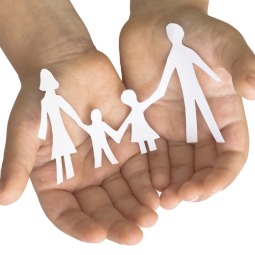Post-‘Obergefell,’ Mississippi Remains the Only State to Ban Gay Adoptions
Four same-sex couples have filed a federal lawsuit challenging the ban, and legal specialists say the Magnolia State may not be able to withstand it.

WASHINGTON — The U.S. Supreme Court’s June 26 decision in Obergefell v. Hodges that legalized same-sex civil marriage in the United States could also force states to compel adoption agencies to place children with homosexual couples.
Since the high court’s landmark ruling, only Mississippi has such a ban in effect, and civil-rights lawyers representing four same-sex couples in that state have filed a federal lawsuit challenging the law.
The post-Obergefell landscape could impact Catholic Charities agencies and religiously affiliated organizations that have placed adopted children for decades. In recent years, anti-discrimination laws prompted Catholic Charities agencies in Massachusetts, Illinois and Washington, D.C., to halt their adoption services, rather than to be compelled to place children with same-sex couples.
Some Catholic officials and sympathetic lawmakers have called for new legislation to create exemptions for religiously affiliated adoption agencies. On June 11, Michigan Gov. Rick Snyder signed a bill that allows faith-based agencies in that state to not place children with same-sex couples.
Maureen Smith, communications director for the Diocese of Jackson, Miss., told the Register that the diocese could request a religious exemption if the federal courts strike down the state’s homosexual-adoption ban.
“Certainly, that is a possibility. This is something we are keeping an eye on, but this is all very preliminary,” Smith said.
In a prepared statement, lawyer Roberta Kaplan, who is representing the plaintiffs in the Mississippi lawsuit, said the state’s ban is discriminatory and “cannot be reconciled with the constitutional guarantees of due process and equal protection,” as interpreted by the Supreme Court in Obergefell.
The lawsuit, filed Aug. 12 by the Campaign for Southern Equality and the Family Equality Council, in fact quotes the Supreme Court’s 5-4 decision to allow same-sex “marriage” in the United States several times, arguing that the ruling clearly says that any law that creates discrimination based on sexual orientation is rooted in animus and “clearly unconstitutional.”
Obergefell Set the Stage
The Mississippi lawsuit cites the majority opinion in Obergefell, where the five concurring justices said “gays and lesbians can create loving, supportive families” and that “many same-sex couples provide loving and nurturing homes to their children.”
The majority opinion in Obergefell goes great lengths to affirm same-sex couples, adding that there is “dignity in the bond between two men or two women who seek to marry and in their autonomy to make such profound choices.”
In fact, several legal scholars believe that Obergefell sets a precedent for same-sex adoption, and they expect the federal courts will strike down the Mississippi law.
“The government could never come up with any secular reason to resist same-sex marriage, and I think it is going to have the same problem with adoption by same-sex couples,” said Douglas Laycock, a leading scholar on religious freedom at the University of Virginia.
“The court has said you cannot treat gay couples any differently than you do any other couples,” said Robert Destro, a law professor and director of the Interdisciplinary Program in Law and Religion at the Columbus School of Law at The Catholic University of America.
“As long as you apply consistent standards — such as the stability of the couple, have they been together for a while, is this a suitable household for the child — you’re not allowed under Obergefell to look at the homosexual nature of the parents’ relationship,” Destro told the Register.
The U.S. District Court for the Southern District of Mississippi could conceivably distinguish between homosexual couples adopting children and same-sex “marriage,” but Laycock believes that to be unlikely.
The state “could say that marriage is a special case, and there is language in Obergefell to support that, but the opinion as a whole surely covers discrimination against gays in any intimate family matter,” Laycock said.
Mississippi officials could also say that same-sex adoption is bad for children, as critics of such adoptions argue, so the state’s interest in maintaining the ban would be stronger, but Laycock said that “there doesn’t seem to be much evidence for that.”
Research Findings
Supporters of same-sex “marriage” and adoption contend that the social science shows that children raised in homosexual households fare just as well in life as their peers in traditional families with a mother and a father. In an amicus brief filed in the Obergefell case, the American Sociological Association said that a “clear and consistent consensus” in the social-science profession holds that children can prosper when they are raised by same-sex parents.
However, other experts have challenged this assertion of such scientifically established “consensus.” University of Texas sociologist Mark Regnerus, who specializes in the study of sexual behavior and family formation, has published research indicating that children of still-married biological parents fare significantly better than children raised in other types of families, including children of same-sex parents.
And Donald Paul Sullins, a sociologist at The Catholic University of America, published a study earlier this year that found emotional problems to be twice as prevalent among children raised by same-sex parents as those raised by opposite-sex parents. Sullins also has challenged the validity of one research study that allegedly showed no negative outcomes of same-sex parenting and of a research tool that, according to Sullins’ analysis, gives rise to biased findings in support of same-sex parenting.
The Catholic Church maintains that children have a right to a father and a mother united in marriage. In 2006, at the World Meeting of Families, Pope Benedict XVI emphasized that the love of a mother and father provides security for children and educates them about the beauty of faithful and eternal love. In June, Pope Francis stressed the importance of children being raised in traditional families with a mother and father.
The U.S. Conference of Catholic Bishops has also criticized studies that look at children raised by two men or two women as “incomplete.” The bishops said some of the studies suffer from small sample sizes or view traits such as “flexible gender identity” as positives.
The arguments over whether children should be placed in same-sex households underlie a premise that supporters of same-sex “marriage” and adoption are trying to establish, namely that any attempt to restrict marriage to the union of one man and woman, or the raising of children to heterosexual married couples, is rooted in bigotry.
“The gay-rights side largely does not distinguish religious principles from animus,” Laycock said. “The Supreme Court was more careful to say that religious principles are often honorable, but that they do not provide a basis for the government to act.”
Problematic Precedents
Along with the recent Obergefell decision, the high court’s decision in Windsor v. United States — a 2013 case that struck down the federal Defense of Marriage Act’s component that limited federal recognition of marriage to heterosexual unions — sets a possible precedent for the federal courts to consider in the Mississippi lawsuit.
The Windsor decision, the plaintiffs in the Mississippi case note, said that denying legal recognition to same-sex couples “humiliates tens of thousands of children now being raised by same-sex couples” and “makes it even more difficult for the children to understand the integrity and closeness of their own family and its concord with other families in their community and in their daily lives.”
What the Supreme Court has done, Destro said, is to establish a precedent that any opposition to homosexuality is essentially rooted in animus.
“It’s profoundly wrong,” Destro said.
That legal quandary places churches and religiously affiliated nonprofits in a difficult position. As far as adoption goes, some officials place their hope in legislation to carve out religious exemptions. Paul Long, the president and CEO of the Michigan Catholic Conference, said legislation that creates such an exemption in Michigan “will ensure the state does not discriminate against social-service agencies that serve the poor and vulnerable, while providing foster care and adoption services to the general public.”
Besides Michigan, Virginia and North Dakota permit state-licensed child-welfare agencies to refuse to place adopted children with same-sex parents if doing so conflicts with their religious beliefs. In every state but Mississippi, same-sex couples can petition for joint adoption. Seven states prohibit discrimination in adoption on the basis of sexual orientation, while two states — California and Rhode Island — also prohibit discrimination based on gender identity.
Federal Initiative
On the federal level, U.S. Rep. Mike Kelly, R-Pa., has filed a bill called the Child Welfare Provider Inclusion Act of 2015, which would prohibit any state or the federal government from taking adverse action against adoption agencies that decline to place children in situations that violate their sincerely held religious beliefs or moral convictions.
Speaking at the Heritage Foundation’s Conservative Policy Summit on Jan. 13, Kelly said the bill was intended to address a movement he said is under way to disqualify religious organizations from adoption services.
Said Kelly, “Why all of a sudden are we discriminating against faith-based people? Why are we discriminating against faith-based organizations?”
Destro agrees that there is a movement to freeze religious organizations out of the adoption field. He said that Catholic Charities in several more states may soon find themselves no longer able to operate adoption services rooted in the Catholic moral conviction that children should be placed with a father and a mother.
He said, “It just can’t be done that way anymore.”
Register correspondent Brian Fraga writes from Fall River, Massachusetts.

















